译林牛津七年级下册英语unit4知识点
译林牛津版七年级英语下册7B unit4 知识点梳理

7B Unit4 <重点短语>1.have to 不得不,必须2.go straight on 一直往前走3.lie down all day long 整天躺着4.walk along 沿着...走5.turn left 向左转6.cross the bridge过桥7.walk past步行经过8.traffic lights 红绿灯9.plenty of大量,足够10.the way to 去...的路<重点句型>1.Sunshine Zoo is north of Sunshine Middle School.阳光动物园在阳光中学的北面。
2.--How will we get there?我们将怎样到那里?--We’ll get there by bus.我们将乘公共汽车到那里。
3.Go straight on, and you’ll find the Panda House.一直向前走,你们就会看到熊猫馆。
4.Remember that they are dangerous.记住它们很危险。
5.Birds make beautiful sounds when they sing.鸟儿在唱歌时会发出美妙的声音。
6.They jump around and make people laugh.它们上蹿下跳,惹得人们大笑。
7.Cross the bridge, and you will see the elephants.过了桥,你们会看到大象。
8.The food is above the drinks.食物在饮料的上方。
9.Walk past the house, turn left and walk along the path next to the river.走过这座房子,向左转,沿着河边的小路走。
10.The treasure is under the ground in front of the third tree on the left.宝藏在左边第三棵树前面的地下。
牛津译林版英语七年级下册Unit4 方位介词用法解析

方位介词用法解析介词是表示句子结构中词与词或句子成分之间关系的一种虚词。
它是各地中考英语常考的一个词类,所以大家一定要掌握好介词的相关知识。
今天对方位介词的分类及用法作一简单归纳。
常用介词用法歌诀in在里面on在上,by和beside在近旁;above表示在上方,below恰好为反向。
若表正上用over,under表示正下方。
in front of表在前,反义behind在后面。
从里穿过用through,表面通过across。
进到里面用into,落到上面用onto。
from表示自何方,to和towards表朝向。
小小介词用处大,反复实践掌握它。
一、表示方位的介词on意为“在……的上面”;over意为“在……(垂直)的正上方”;above意为“在……(不一定垂直)的上方”;under意为“在……(垂直的)正下方”;below意为“在……(不一定垂直)的下方”;near意为“在……附近”;next to意为“紧挨着……”;round / around意为“在……周围”;by意为“在……旁边”;表示两者的位置关系时in表示“在同一区域内或同一范围内”;on表示“接壤;相邻”;to表示“相离;相隔”,两者不属同一范围,也不接壤。
二、表示运动方向的介词across意为“从……表面穿过”,或沿某一条线的方向而进行的动作;through 意为“从……内部穿过”,past和by表示“从旁边经过或路过”。
如:Please be careful when you go ________ the street.Look! The mosquito is trying to fly ________ the window.We often go ________ a bakery on our way to school.。
译林英语七下知识点单元复习Unit4
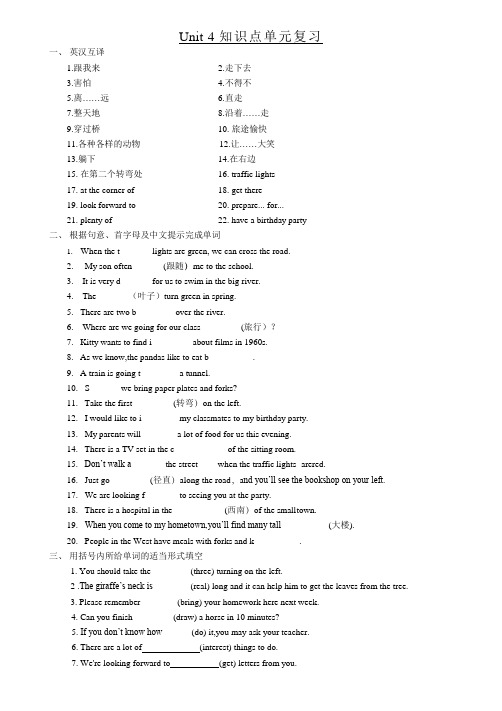
一、英汉互译1.跟我来 _________________________2.走下去_______________________________3.害怕 ___________________________4.不得不_______________________________5.离……远 _______________________6.直走_________________________________7.整天地 _________________________ 8.沿着……走___________________________9.穿过桥 _________________________ 10. 旅途愉快 ____________________________11.各种各样的动物 ________________ 12.让……大笑 __________________________13.躺下 __________________________ 14.在右边______________________________15. 在第二个转弯处________________ 16. traffic lights __________________________17. at the corner of _________________ 18. get there _____________________________19. look forward to _________________ 20. prepare... for... ________________________21. plenty of ______________________ 22. have a birthday party ___________________二、根据句意、首字母及中文提示完成单词1.When the t ______ lights are green, we can cross the road.2. My son often ______ (跟随)me to the school.3. It is very d______ for us to swim in the big river.4. The ______ (叶子)turn green in spring.5. There are two b _______ over the river.6. Where are we going for our class ________ (旅行)?7. Kitty wants to find i ________ about films in 1960s.8. As we know,the pandas like to eat b _________ .9. A train is going t _______ a tunnel.10. S _____ we bring paper plates and forks?11. Take the first ________ (转弯)on the left.12. I would like to i _______ my classmates to my birthday party.13. My parents will _______ a lot of food for us this evening.14. There is a TV set in the c ___________ of the sitting room.15. Don’t walk a ______ the street when the traffic lights arered.16. Just go ________ (径直)along the road,a nd you’ll see the bookshop on your left.17. We are looking f ______ to seeing you at the party.18. There is a hospital in the ___________ (西南)of the small t own.19. When you come to my hometown,you’ll find many tall__________ (大楼).20. People in the West have meals with forks and k _________ .三、用括号内所给单词的适当形式填空1. You should take the ________ (three) turning on the left.2 .The giraffe’s neck is_______ (real) long and it can help him to get the leaves from the tree.3. Please remember _______ (bring) your homework here next week.4. Can you finish ________ (draw) a horse in 10 minutes?5. If you don’t know how _____ (do) it,you may ask your teacher.6. There are a lot of (interest) things to do.7. We're looking forward to (get) letters from you.8. I’d like(invite) Jim ________ (go) on a trip to the park.9. On _____ (she) way home, Ann met a friend of hers.10. She wants ______ (be) a good teacher when she grows up.11. ____ (be) there plenty of treasure in the box?12. We plan to go out for a picnic. So we hope it ______ (not rain) tomorrow.13. Why not ___ (invite) him ___________ (have) dinner together?14. There _____ (not be) any football matches on CCTV-5 this evening,are there?15. Don’t forget ____ (give) her some food and water.16. If you go to visit the museum next week,I ______ (follow) you.17. After ______ (have) classes, the students play games.18. Take the third ______ (cross) on the right.19. They are looking forward to ______ (have) a party.20. Can you hear the girls _____ (sing) in the next room now?四、1.Walk ______ on until you reach the end(尽头).2.I live on the _______ floor of this building.3.I hope it will be _______ tomorrow. We'll climb the hill.4.The supermarket is ________ from 8 :00 a. m. to 8: 00 p. m.5. —When _____ we _______ tomorrow morning? —At eight.6. — ____ they ________ a meeting next Tuesday? —No,th ey aren’t,7. Simon is swimming _______ the river.8. The children are singing and dancing _________ .9. What’s the Chinese_______ of the word?10. He is very thirsty( 口渴的),so he stops __________ some water.五、单项选择( )1. Tomorrow will be rainy. Kitty __________ take the umbrella with her.A. haveB. has toC. had toD. will haveto( )2, Which is ________ your new house?A. the way toB. the wayC. the way to getD. the way getting to( )3.1 usually go to school __________ .A. by the bikeB. by an bikeC. on bikeD. on the bike( )4. —Who is ________ girl in front of the library?—The one with ________ umbrella? She is our monitor.A. the;aB. the;anC. a;anD. a; the( )5. It’s very hard _________ the swamp(沼泽).A. acrossB. crossC. to acrossD. to cross( )6. —________ is it from the New Town to the old city centre?—Less than 30 minutes by underground.A. How soonB. How oftenC. How longD. How far( )7. The moonlight is shining in _____________ the window.Everything in theroom looks so nice.A. overB. acrossC. throughD. past( )8. Let's go to the supermarket __________ underground.A. onB. inC. byD. with( )9. Tony, remember ________ with your mouth full of food.A. to talkB. not to talkC. talkingD.talk( )10. There ________ a meeting next week.A. hasB. is going to haveC. is going to beD. will have( )11. _________ something wrong with my bike. Can I use yours?A. It isB. It wasC. There i sD. Therewas( )12. Is your bedroom ________ the third floor __________ the house?A. at;ofB. in; inC. on; inD. on;of( )13. Heilongjiang Province is _________ the northeast of China.A. toB. inC. on( )14. Jim sits behind me,so I sit __________ him.A. at the top ofB. at the end ofC. is themiddle of nD. in front of( )15. —The room is very dirty. __________ we clean it? 一OK!A. WillB. ShallC. DidD. Are六、句型转换1.Daniel and Simon will join us.(改为否定句)Daniel and Simon ________________ us.2.Turn right at the first crossing.(改为同义句)______ the first ________ on the ________ .3.Climb up the tree,please.(改为否定句)_______________ up the tree.4.My mother is going to buy me a CD.(对画线部分提问)______________ your mother going to __________ ?lie and Sandy are going to buy food.(改为一般疑问句,并作肯定回答)一 ______ Millie and Sandy _________________ b uy food? —Yes, they .6.The exchange students will go to Xiangshan tomorrow.(对画线部分提问)_______________ the exchange students ______ tomorrow?7. We shall meet at 9:30 a. m. at the school gate.(改为一般疑问句,并作否定回答)—_______ we _______ at 9: 30 a. m. at the school gate? —No, we .8. We hope we will be able to join the farewell party.(改为同义句)We ________________________ the farewell party.9. Which is the way to Tian’anmen Square?(改为同义句)_____ can I _______________ Tian’anmen Square?10. Cross the bridge to South Road and turn left.(改为同义句)the bridge to South Road and turn left.七、根据中文提示完成句子1.你们打算下周五去参观长城吗?______ you _________________________ the Great Wall next Friday?2.——请问,我怎样才能到达花园大厦?——朝公园的方向走,然后在第一个路口向左拐。
牛津译林版七年级英语下册Unit4重点短语及核心句型归纳
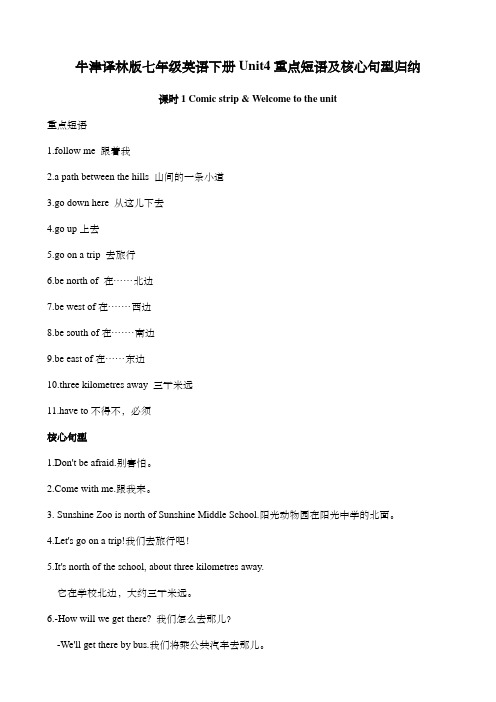
牛津译林版七年级英语下册Unit4重点短语及核心句型归纳课时1 Comic strip & Welcome to the unit重点短语1.follow me 跟着我2.a path between the hills 山间的一条小道3.go down here 从这儿下去4.go up上去5.go on a trip 去旅行6.be north of 在······北边7.be west of在·······西边8.be south of在·······南边9.be east of在······东边10.three kilometres away 三千米远11.have to不得不,必须核心句型1.Don't be afraid.别害怕。
e with me.跟我来。
3. Sunshine Zoo is north of Sunshine Middle School.阳光动物园在阳光中学的北面。
4.Let's go on a trip!我们去旅行吧!5.It's north of the school, about three kilometres away.它在学校北边,大约三千米远。
6.-How will we get there? 我们怎么去那儿?-We'll get there by bus.我们将乘公共汽车去那儿。
课时2 Reading重点短语1.a trip to the zoo 一次动物园之旅2.go straight on 径直往前走3.like to eat bamboo喜欢吃竹子4. lie down all day long 整天躺着e here to see them 来这儿看它们6.walk along the road 沿着路走7.to the north of...在·······北边8.the king of the animal world 动物世界之王9.never go near them千万别靠近它们10.turn left/right向左/右拐11.make beautiful sounds 发出美妙的声音12.be clever and funny聪明而滑稽13.jump around 蹦来蹦去14.make people laugh 使人们大笑15.eat the leaves from trees 吃树上的树叶16.cross the bridge 过桥17.be like open fans 像敞开的扇子18.all kinds of animals 各种动物核心句型1. Go straight on, and you'll find the Panda House一直往前走,你就会看到熊猫馆。
译林牛津版七年级英语下册7B Unit4 按课时知识点梳理及拓展
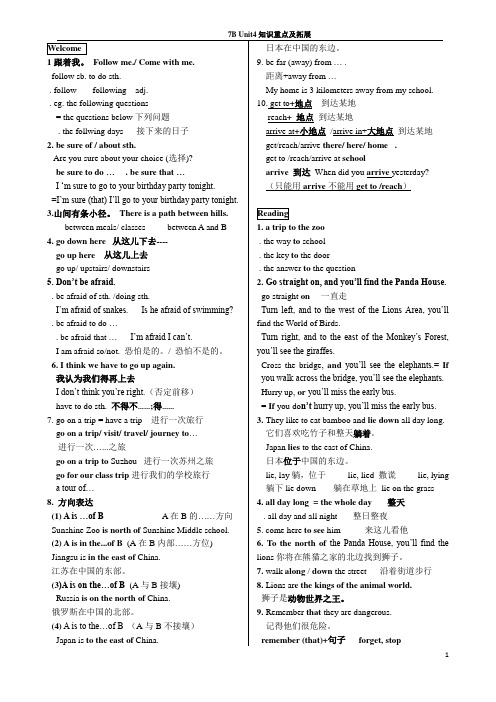
9. Remember that they are dangerous. 记得他们很危险。
remember (that)+句子 forget, stop
1
7B Unit4 知识重点及拓展
remember to do … 记得去做某事 (未做) Remember to close the window when you leave remember doing … 记得做过某事 (已经做过)
(4) A is to the…of B (A 与 B 不接壤)
Japan is to the east of China.
Cross the bridge, and you’ll see the elephants.= If
you walk across the bridge, you’ll see the elephants.
go up here 从这儿上去
1. a trip to the zoo . the way to school . the key to the door
go up/ upstairs/ downstairs
. the answer to the question
5. Don’t be afraid. . be afraid of sth. /doing sth.
Japan lies to the east of China. 日本位于中国的东边。
lie, lay 躺,位于 lie, lied 撒谎 lie, lying
躺下 lie down 躺在草地上 lie on the grass
4. all day long = the whole day 整天
. all day and all night 整日整夜
Unit 4 Find your way【复习课件】七年级英语下册单元复习(牛津译林版)
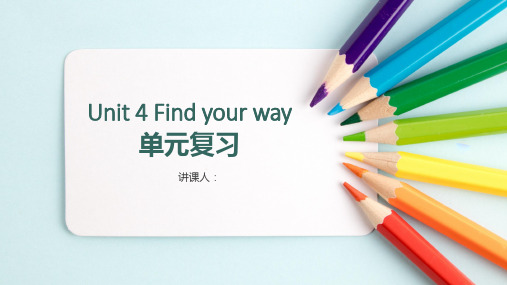
north-east 东北方
单词过过过
9. 危险的 adj. ___d_a_n_g_e_r_o_u_s__ 10. 记得;记住 v. __r_em__e_m__b_e_r_ remember to do sth. 记得去做某事
remember doing sth. 记得做过某事
11. 森林 n. __fo_r_e_s_t__ 12. 大笑 v. __l_a_u_g_h____ 13. 好笑的,滑稽的 adj. __fu_n_n__y_ 14. 叶子 n. ___le_a_f____ 复数形式:leaves 15. 穿过,横过 prep. __a_c_r_o_s_s__ 16. 在……里面 prep. ___i_n_si_d_e__ 反义词:outside 17. 桥 n. _b__ri_d_g_e_
prepare plenty of food and drinks for us 1. 在去…的路上 on the way to… 2. 从A出口出去 get out at Exit A
过句型
句型过过过
1. Sunshine Zoo is north of Sunshine Middle School. 阳光 动物园在阳光中学的北边。
单词过过过
二、根据提示填空。
1. You must remember __t_o__c_le_a_n_ (clean) the classroom. 2. Come in. It’s cold o utside . 3. You go first and I will f_o_l_lo_w_____ you later. 4. Xiamen is in the ___n_o_r_th_e_a_s_t_ (东北)of China.. 5. The light shines ___a_cr_o_s_s__ (穿过) the eyes of the lanterns. 6. In Spring, we can see green _l_e_a_v_e_s_ (树叶)and grass everywhere. 7. It’s d_a_n_g_e_ro_u__s_ to play football in the street.
初中英语 牛津译林版七年级下册 Unit 4 Finding your way 知识点
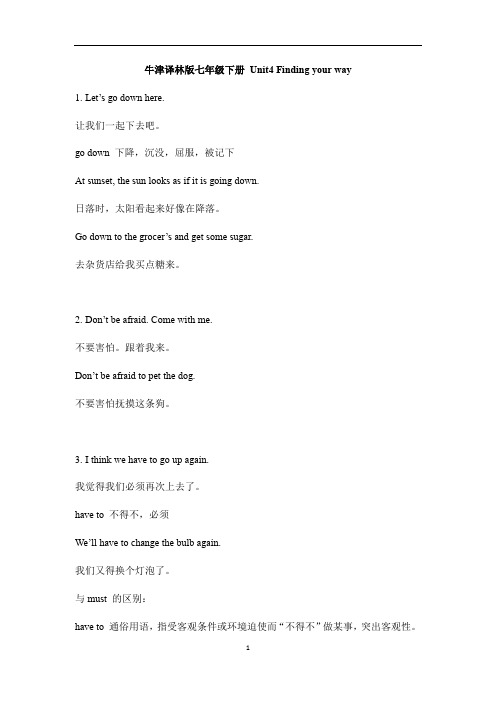
牛津译林版七年级下册Unit4 Finding your way1.Let’s go down here.让我们一起下去吧。
go down 下降,沉没,屈服,被记下At sunset, the sun looks as if it is going down.日落时,太阳看起来好像在降落。
Go down to the grocer’s and get some sugar.去杂货店给我买点糖来。
2.Don’t be afraid. Come with me.不要害怕。
跟着我来。
Don’t be afraid to pet the dog.不要害怕抚摸这条狗。
3.I think we have to go up again.我觉得我们必须再次上去了。
have to 不得不,必须We’ll have to change the bulb again.我们又得换个灯泡了。
与must 的区别:have to 通俗用语,指受客观条件或环境迫使而“不得不”做某事,突出客观性。
must 通常表示命令或说话人主观认为必须要做某事,含强调语气,侧重主观性。
I have to have someone to look after.我必须去照顾某人。
Then you must be my cousin.那么你一定是我的远亲了。
go up 增长,建起,炸毁Go up to the fork and turn left.走到岔口处向左拐。
Production is going up in leaps and bounds.产量飞速增长。
4.Sunshine Zoo is north of Sunshine Middle School.阳光动物园在阳光中学的北面。
be + 方位词+ of ... (某地)在(另一地)的......方向Our school is south of the zoo.我们学校在动物园的南面。
英语中东南、东北、西南和西北的表达分别是south-east, north-east, south-west, north-west。
牛津译林版英语七年级下册Unit4 巧学妙记:定冠词的用法
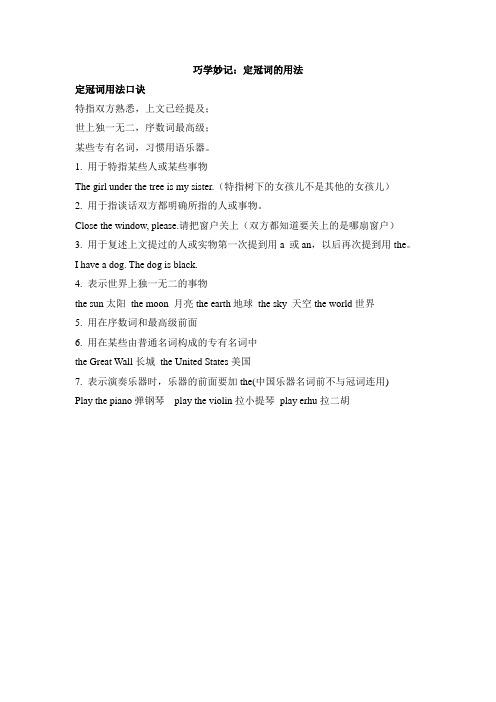
巧学妙记:定冠词的用法
定冠词用法口诀
特指双方熟悉,上文已经提及;
世上独一无二,序数词最高级;
某些专有名词,习惯用语乐器。
1. 用于特指某些人或某些事物
The girl under the tree is my sister.(特指树下的女孩儿不是其他的女孩儿)
2. 用于指谈话双方都明确所指的人或事物。
Close the window, please.请把窗户关上(双方都知道要关上的是哪扇窗户)
3. 用于复述上文提过的人或实物第一次提到用a 或an,以后再次提到用the。
I have a dog. The dog is black.
4. 表示世界上独一无二的事物
the sun太阳the moon 月亮the earth地球the sky 天空the world世界
5. 用在序数词和最高级前面
6. 用在某些由普通名词构成的专有名词中
the Great Wall长城the United States美国
7. 表示演奏乐器时,乐器的前面要加the(中国乐器名词前不与冠词连用)
Play the piano弹钢琴play the violin拉小提琴play erhu拉二胡。
牛津译林初中英语七年级下学期unit4语法—方位介词
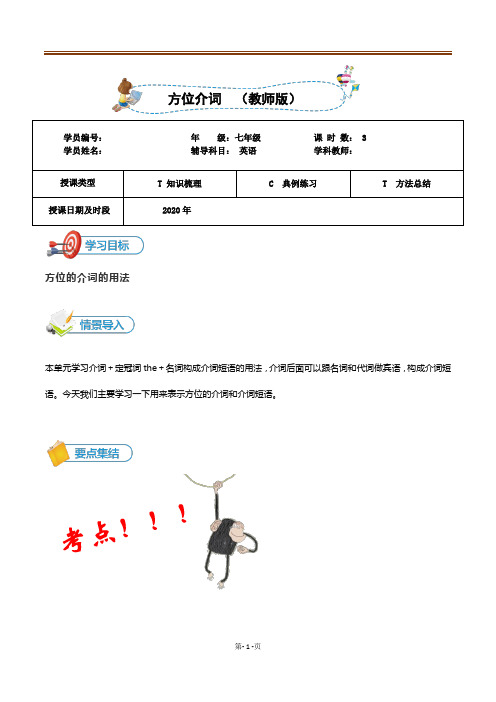
方位介词(教师版)学员编号:年级:七年级课时数: 3学员姓名:辅导科目:英语学科教师:授课类型T 知识梳理 C 典例练习T 方法总结授课日期及时段2020年方位的介词的用法本单元学习介词+定冠词the+名词构成介词短语的用法,介词后面可以跟名词和代词做宾语,构成介词短语。
今天我们主要学习一下用来表示方位的介词和介词短语。
方位的介词的用法:1. on介词on表示“在某物之上”的意思,它通常表示一个物体在另一个物体之表面上面。
两者之间有接触。
例如:Your book is on the desk. 你的书在课桌上面。
2. in介词in表示“在某物的里面”,它通常表示一个物体在另外一个物体的内部、中间或者在某个范围之内。
例如:Your pen is in the pencil case. 你的钢笔在铅笔盒里面。
3. under介词under表示“在某物的下面”,它通常表示一个物体在另外一个物体的垂直正下面,两者之间没有接触。
例如:My bike is under the tree. 我的自行车在树的下面。
The shoes are under the chair. 鞋在椅子的下面。
拓展:under和below 的区别under表示“在……之下”,通常表示位置处于正下方,与介词over“在……上方”相对应。
例如: There is a book under the table. 桌子下面有一本书。
below表示“在……之下”,“在……的下游”,与介词above相对应,常指在某物体之下,但不一定在该物的正下方。
例如:He is below the average at school.他的学习成绩在水准以下。
4. behind介词behind表示“在某物的后面”,它通常表示一个物体在另外一个物体的后面。
例如:Your brother is behind the tree. 你的弟弟在树的后面。
5. next tonext to是由形容词next和介词to构成的介词短语表示“紧挨着、在某物的旁边”的意思。
Unit4知识整理单元测验牛津译林版英语七年级下册
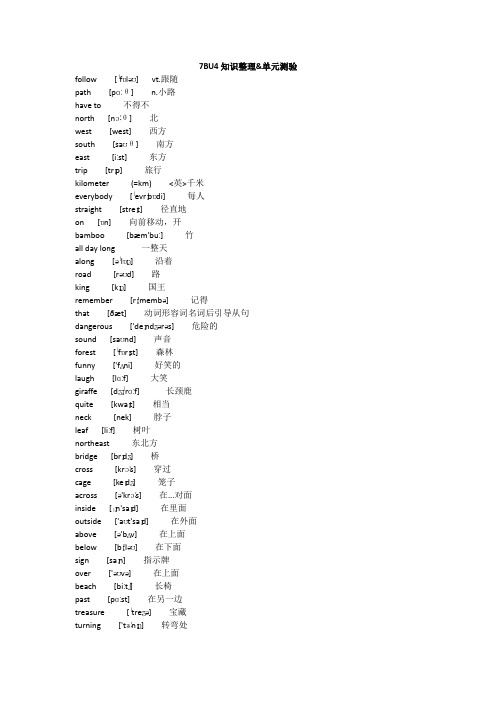
7BU4知识整理&单元测验follow [ˈfɒləʊ] vt.跟随path [pɑːθ] n.小路have to 不得不north [nɔːθ] 北west [west] 西方south [saʊθ] 南方east [iːst] 东方trip [trɪp] 旅行kilometer (=km) <英>千米everybody [ˈevrɪbɒdi] 每人straight [streɪt] 径直地on [ɒn] 向前移动,开bamboo [bæm'buː] 竹all day long 一整天along [əˈlɒŋ] 沿着road [rəʊd] 路king [kɪŋ] 国王remember [rɪ'membə] 记得that [ðæt] 动词形容词名词后引导从句dangerous ['deɪndʒərəs] 危险的sound [saʊnd] 声音forest [ˈfɒrɪst] 森林funny ['fʌni] 好笑的laugh [lɑːf] 大笑giraffe [dʒɪˈrɑːf] 长颈鹿quite [kwaɪt] 相当neck [nek] 脖子leaf [liːf] 树叶northeast 东北方bridge [brɪdʒ] 桥cross [krɔːs] 穿过cage [keɪdʒ] 笼子across [ə'krɔːs] 在...对面inside [ˌɪn'saɪd] 在里面outside ['aʊt'saɪd] 在外面above [ə'bʌv] 在上面below [bɪ'ləʊ] 在下面sign [saɪn] 指示牌over ['əʊvə] 在上面beach [biːtʃ] 长椅past [pɑːst] 在另一边treasure [ˈtreʒə] 宝藏turning ['tɜːnɪŋ] 转弯处traffic ['træfɪk] 交通traffic lights 红绿灯should [ʃʊd] 应该crossing ['krɔːsɪŋ] 交叉路口corner ['kɔːnə] 拐角prepare [prɪˈpeə] 准备prepare ... for ... 为……准备……plenty [pliːzd] 大量plenty of 大量exit ['eksɪt] 出口bank [bæŋk] 银行02Unit4 知识梳理【重点短语】1. find the/your/my way (to sp.) 找到去某地的路2. follow sb./ go after sb. to sw. 跟某人去某地3.have to do sth. 不得不做某事4.like to eat bamboo 喜欢吃竹子5.go for a class trip/go on a class trip 进行一次班级旅行6.a trip to the zoo 去动物园的一次旅行7.be far (away) from ... 离.....远8.be three kilometers away from... 离......三公里的距离9.get here/there/home (arrive here/there/home) 到达这儿/那儿/家10.lie down all day long 整天躺着11.be quite tall=be very tall 相当高12.jump around 四处跳跃13.cross the bridge=go across the bridge 过桥14.be like open fans 像打开的扇子15.lie on the grass 躺在草地上16.look like its mother 看起来像它的妈妈17. in an open area 在一开阔地18.on the left/on the right 在左边/右边19.find treasure 找到财宝20.at the traffic lights 在红绿灯处21.at the corner of the street=at the street corner 在街道拐角处22.in the corner of the room 在房间角落里23.prepare sth. for sb. 为某人准备…24.plenty of /lots of food and drinks 大量的食物和饮料25.get out at Exit A 在A出口处出来start at 2 p.m. on Sunday ,21 April在4月21日,星期天下午两点开始【词形变化】1. north(n.)北方northern(adj.) 北方的south (n.) 南方southern(adj.) 南方的west (n.) 西方western(adj.) 西方的east (n.) 东方eastern(adj.) 东方的2. northeast东北northwest 西北southeast 东南southwest西南3. lie (v)lyinglay /ei/ 过去式4. dangerous (adj) danger(n)5. funny (adj) fun(n.)6. leaf leaves (复数)7. visit (v)visitor(n)【语言知识点】1. It’s north /east / northwest of the school=It’s to the north /east/northwest of the school.在学校的北/东/西北部。
Unit4单词讲解牛津译林英语七年级下册

1.follow vt. 跟随;仿效o固定搭配:follow sb. 跟随某人;follow the rules 遵守规则o例句:She followed her mother into the kitchen. 她跟着母亲进了厨房。
2.path n. 小路,小径o固定搭配:on the path 在小路上o例句:The path led through the dense forest. 小路穿过茂密的森林。
3.have to不得不,必须o固定搭配:have to do sth. 必须做某事o例句:I have to finish my homework before I can go out. 我必须完成家庭作业才能出去。
4.north n.,adj.&adv. 北,北方o固定搭配:in the north 在北方;to the north of 在……的北部o例句:The city lies to the north of the river. 城市位于河流的北部。
5.west n.,adj.&adv. 西,西方o固定搭配:in the west 在西方;to the west of 在……的西部o例句:The sunset was beautiful in the west. 西方的日落很美。
6.south n.,adj.&adv. 南,南方o固定搭配:in the south 在南方;to the south of 在……的南部o例句:The island is located to the south of the mainland. 这个岛屿位于大陆的南部。
7.east n.,adj.&adv. 东,东方o固定搭配:in the east 在东方;to the east of 在……的东部o例句:The sun rises in the east. 太阳从东方升起。
+Unit+4+Finding+your+way+知识点汇总 牛津译林版七年级英语下册

7BUnit4 Finding your way 知识点汇总一、Comic strip and Welcome to the unit.1. follow me 跟我来【=come with me】【拓展】following 形容词:接下来的、以下的the following week = the next week 下一周2. Are you sure?你确定吗?【复习】be sure 用法:(1)be sure of/about sth. (2)be sure to do sth.(3)be sure +(that)宾从3.Let's go on a trip. 让我们去旅行。
【重点】go on a trip to sp. = travel to sp. = go to sp. for a trip 去某地旅行4.have to go up again 不得不再上去5.Sunshine Zoo is north of Sunshine Middle School.【重点】表示“A在B的东/南/西/北面"用句型:A is east/south/west/north of B其同义句是(另一种表达方式):A is to/on the east/south/west/north of BEg: Nanjing is west of Shanghai=Nanjing is to the west of Shanghai表示方位的介词in.on与to的区别:(1)in 表示A在B的范围之内,Jiangsuis in_the south ofChina.江苏在中国南部。
(2)to 表示两者不接壤,在范围以外,不是从属关系:Japanis to the east ofChina. 日本在中国东面.(3)on 表示两地接壤,在范围以外,不是从属关系:Russia is on the north ofChina. 俄罗斯在中国北面。
江苏专版牛津译林七年级下册 Unit 4 知识点总结
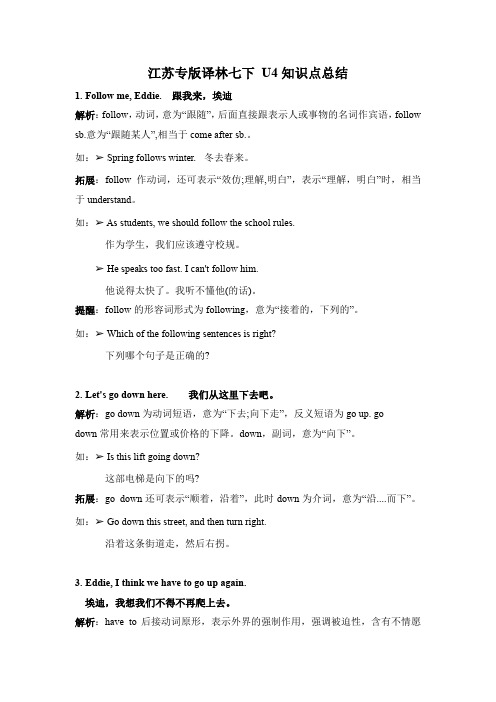
江苏专版译林七下U4知识点总结1.Follow me, Eddie. 跟我来,埃迪解析:follow,动词,意为“跟随”,后面直接跟表示人或事物的名词作宾语,follow sb.意为“跟随某人”,相当于come after sb.。
如:➢ Spring follows winter. 冬去春来。
拓展:follow作动词,还可表示“效仿;理解,明白”,表示“理解,明白”时,相当于understand。
如:➢ As students, we should follow the school rules.作为学生,我们应该遵守校规。
➢ He speaks too fast. I can't follow him.他说得太快了。
我听不懂他(的话)。
提醒:follow的形容词形式为following,意为“接着的,下列的”。
如:➢ Which of the following sentences is right?下列哪个句子是正确的?2.Let's go down here. 我们从这里下去吧。
解析:go down为动词短语,意为“下去;向下走”,反义短语为go up. godown常用来表示位置或价格的下降。
down,副词,意为“向下”。
如:➢ Is this lift going down?这部电梯是向下的吗?拓展:go down还可表示“顺着,沿着”,此时down为介词,意为“沿....而下”。
如:➢ Go down this street, and then turn right.沿着这条街道走,然后右拐。
3.Eddie, I think we have to go up again.埃迪,我想我们不得不再爬上去。
解析:have to后接动词原形,表示外界的强制作用,强调被迫性,含有不情愿的色彩,常译为“不得不,必须”如:➢ We have to finish the work before supper.我们不得不在晚饭前完成这项工作。
七年级英语下册知识讲义-Unit 4 Finding your way!-牛津译林

一、学习目标1. 知识目标:A. 学会重点词汇:follow, north, west, south, east, trip, kilometer, everybody, straight, bamboo, along, road, king, remember, that, dangerous, sound, forest, funny, laugh, giraffe, quite, neck, leaf(pl. leaves), north-east, bridge, cross, across, inside, outsideB. 学会重点短语:go down, come with me, have to, go up, go on a trip, be north of, lie down, all day long, turn left, to the east of…, half an hour laterC. 学会句型:Don’t be afraid. Come with me. I think we have to go up again.Sunshine Zoo is north of Sunshine Middle School.Is it far away from our school?Go straight on and you’ll find the Panda House.Birds make beautiful sounds when they sing.They jump around and make people laugh.Their ears are like open fans.2. 能力目标:A. 能够正确使用四会词汇,并熟练地掌握好这些词汇的基本用法。
B. 能够正确地指路,说出到某地怎么走。
二、重点、难点重点:掌握重要词汇和短语以及重点句型。
难点:灵活使用重要的短语和句型,并能说出到某地怎么走。
译林版牛津英语七年级下册全册Unites1-8单元知识点及语法归纳

译林版牛津英语七年级下册全册Unites1-8单元知识点及语法归纳一、重点词组、句型1、Would you like to live in the palace, Eddie? 埃迪,你想住宫殿里吗?①Would you like sth? 肯定答复: Yes, please. 否认答复: No, thanks.②Would you like to do sth? 肯定答复:Yes, I’d like/love to. 否认答复:I’d like/love to, but…2、There are twenty restaurants in town. 镇上有二十家餐馆。
There are about 8,000,000 people living in London. 大约有八百万人住在伦敦。
①表示某地有……,用there be 句型,谓语动词就近原那么。
There __________(be) an art room, a music room and two puter rooms in our school.②表示有事情要做,用there be sth to do。
Thereare lots of things ___________(see) in Beijing..③表示有某人正在做某事,用there be sb doingsth.。
On game shows, there are always famouspeople___________(talk) about their lives.3、I live in a town 15 miles from London. 我住在离伦敦15英里的一个镇上。
be far (away) from 离……远,但出现详细间隔时,不用farMy home is __________________from the school.My home is 5 kilometres ___________from the school.A. awayB. farC. closeD. next to4. have fun with sb./sth. 和某人/某物玩得开心have fun doing sth. 做某事很开心have(has/had) fun= have(has/had) a good time=enjo y(enjoyed) onself(myself/yourself/youselves……)5、I also have a bedroom of my own. =I also havemy own bedroom. 我也有自己的房间。
牛津译林版七年级英语下册Unit4词组知识点归纳

牛津译林版七年级英语下册Unit4词组知识点归纳一、词组或短语序号Chinese English1跟我来。
(2)follow me = come with me2在A和B之间between A and B3一定做某事/ 务必做某事be sure to do sth4对某事有把握be sure of sth5确信……be sure that + 从句6别害怕Don’t be afraid7不得不have / has to8不必要don’t / doesn’t have to9进行旅行/去旅行(2)go on a trip = have a trip10在……北面(不接壤)(2)be north of = be to the north of11在……北面(接壤)be on the north of12在……北面(被包含)be in the north of13我们到哪儿去进行班级旅行?Where are we going for our class trip?14三公里远three kilometers away15直走walk / go straight on16他们喜欢吃竹子并整天躺着。
They like to eat bamboo and lie down all day long. 17许多游客来这儿看他们。
Many visitors come here to see them.18沿着这条路走walk along the road19记住他们是危险的。
Remember that they are dangerous.20不要靠近他们。
Never go near them.21向左转/ 向右转turn left / turn right22鸟儿唱歌时发出优美的声音。
Birds make beautiful sound s when they sing.23他们上蹿下跳惹得人们大笑。
They jump around and make people laugh.24使某人做某事make sb do sth25他们的长脖子帮助他们吃到树上的Their long necks help them eat the leaves fromthe trees.26在鸟的世界的北面是猴子的森To the north of the World of Birds is theMonkeys’ forest.27过桥(2)cross the bridge = go across the bridge28过了桥,你将会看到大象。
牛津译林版七年级英语下册Unit 4 Finding your way

拓展 后接(不带to的不定式)动词原形作宾语补足语的动词或动词短语有:
一感(feel),二听(hear,listen to),三让(let,make,have),四看 (watch,see,notice,look at)。
提醒 有些动词则必须跟带to的动词不定式作宾语补足语。
如:ask/tell/want sb.(not) to do sth. 要求/告诉/想要某人(不要)做某事。
3. Eddie, I think we have to go up again.
have to+动词原形 含有不情愿的色彩,意为“不得不,必须” e.g. We have to finish the work before dinner.
2022/4/11
1.Let’s go on a trip. go on意为“去做.....” go on a trip= have a trip 去旅行 go on还可意为“继续”,go on doing sth=keep doing“继续做某事” e.g. I’m so tired that I can’t go on learning. 2. Sunshine Zoo is north of Sunshine Middle School. be+方位词+of 意为“在....的.....方向 =be+to+the+方位词+of 指范围之外,且中间有一段距离。
Unit4 重点词汇及词组背诵材料-2021-2022学年牛津译林版七年级英语下册
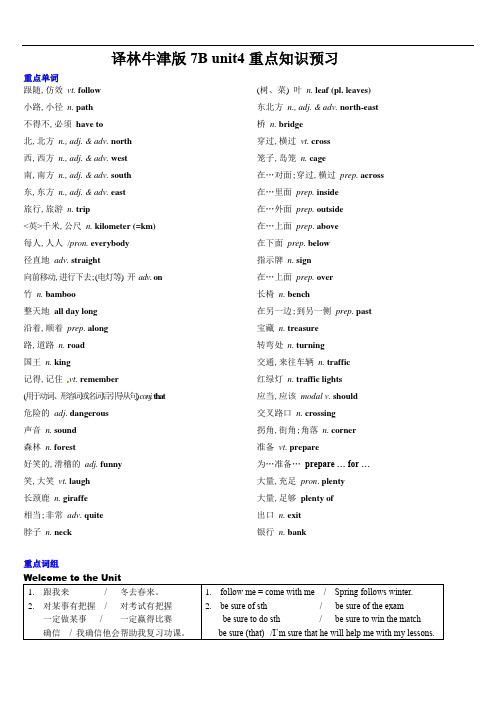
译林牛津版7B unit4重点知识预习重点单词跟随,仿效vt. follow小路,小径n. path不得不,必须have to北,北方n., adj. & adv. north西,西方n., adj. & adv. west南,南方n., adj. & adv. south东,东方n., adj. & adv. east旅行,旅游n. trip<英>千米,公尺n. kilometer (=km) 每人,人人/pron.everybody径直地adv. straight向前移动,进行下去;(电灯等)开adv. on 竹n. bamboo整天地all day long沿着,顺着prep. along路,道路n. road国王n. king记得,记住vt. remember(用于动词、形容词或名词后引导从句) conj. that 危险的adj.dangerous声音n. sound森林n. forest好笑的,滑稽的adj. funny笑,大笑vt. laugh长颈鹿n. giraffe相当;非常adv. quite脖子n. neck (树、菜)叶n. leaf (pl. leaves)东北方n., adj. & adv. north-east 桥n. bridge穿过,横过vt. cross笼子,岛笼n. cage在…对面;穿过,横过prep. across 在…里面prep. inside在…外面prep. outside在…上面prep.above在下面prep. below指示牌n. sign在…上面prep. over长椅n. bench在另一边;到另一侧prep. past宝藏n. treasure转弯处n. turning交通,来往车辆n. traffic红绿灯n. traffic lights应当,应该modal v. should交叉路口n. crossing拐角,街角;角落n. corner准备vt. prepare为…准备…prepare … for …大量,充足pron.plenty大量,足够plenty of出口n. exit银行n. bank重点词组1.跟我来/ 冬去春来。
- 1、下载文档前请自行甄别文档内容的完整性,平台不提供额外的编辑、内容补充、找答案等附加服务。
- 2、"仅部分预览"的文档,不可在线预览部分如存在完整性等问题,可反馈申请退款(可完整预览的文档不适用该条件!)。
- 3、如文档侵犯您的权益,请联系客服反馈,我们会尽快为您处理(人工客服工作时间:9:00-18:30)。
7BU4 Finding the wayWelcome 语言点1. A is +方向of B (A在B的什么方位)上海在南京的东面Shanghai is of Nanjing. =Shanghai is to the east of Nanjing.A is in the +方向of B(A在B里面什么方位)上海在中国的东面Shanghai is of China. 台湾在中国的东南Taiwan is in the southeast of China.美国在加拿大的南面。
The US is (to the) south of Canada.公园在学校的西北面。
The park is (to the) northwest of the school.北京在中国的北部。
Beijing is in the north of China. =Beijing is in the northern part of China.北京在江苏的北面。
Beijing is (to the) north of Jiangsu.山东在江苏的北面。
Shandong is (to the)north of Jiangsu.香港在中国的南部,澳门在香港的西部。
(Hong Kong, Macau)2. Follow me, Eddie. =Come with me. (follow=come/go after)follow sb. to sp. 请跟我到图书馆。
Please follow me to the library.跟我来,我会告诉你路线。
Follow me and I’ll show you the way.冬去春来。
Spring follows winter. 沿着这条街走到公交车站。
Follow the street to the bus stop. 3. Are you sure, Hobo? be sure 确信,有把握(1) be sure to do sth. 表示说话人推测“一定,必然会”。
天肯定会下雨。
It _____ ______ ____ rain.(2) be sure + that从句,确信……我确信我能比你跑得快。
I’m ____ ___ I can run faster than you .(3)Are you sure? (4)Don’t be so sure.(5)be sure of/ about sth be sure of/about doing sth 确信,对(做)某事有把握一定要写信告诉我所有的消息。
Be sure to write to me and tell me all the news.你对钱有把握吗?Are you sure of money? 我确信他会帮助我。
I’m sure (that) he can help me. 4. Don’t be afraid. ①祈使句:e.g. 上学不要迟到Don’t be late for school.不要在街上踢足球Don’t play football on/in the street. Never come here again.②(1) be afraid of (doing) sth. 害怕(做)某事,表示“怕……”“担心……”不要害怕犯错误。
Don’t be afraid of mak ing mistakes.他总是害怕一个人呆在家里。
He is always afraid of stay ing at home alone.这个小孩怕狗。
The little boy is afraid of the dog .(3) be afraid to do sth. 害怕做某事,着重指“因害怕而不敢做某事”。
夜间他不敢独自外出。
He is afraid to go out alone at night .(4) be afraid ( that ) 从句表示“引出不好的消息或带有歉意的回绝:。
抱歉,我恐怕帮不了你。
Sorry, I am afraid (that) I can’t help you .(5)I’m afraid not.I’m afraid so.5. have to go up again have to do 不得不做…他不得不帮他妈妈做家务。
He has to help his mum do/with the housework.改成否定句:He doesn’t have to help….have to do…否定句don’t /doesn’t have to do 不必做。
下雨了,我不得不呆在家里。
It’s raining. I have to stay at home.她妈妈病了,她不得不照顾她。
Her mother is ill, so she has to look after her.你不必敲门。
You don’t have to knock at/on the door.我不能和你玩游戏,我得先做作业。
I can’t play games with you because I have to do my homework first.我必须学好英语,因为我发现它很有用。
I must learn English well because I fine it is very useful.6. Let‘s go on a trip (to sp.)!have/take /go on a trip to sp. 进行一次去...的旅行be on a trip to sp...在去...的旅行中我们正计划着一次去故宫的班级旅行。
We are planning a class trip to the Palace Museum.他们正期盼着进行一次去阳光镇的学校旅行。
They are looking forward to having/taking a school trip to Sunshine Town.7…about three kilometres away (from my school).动物园离我学校4千米远。
The zoo is four kilometres away from my school.我们学校离体育中心很远。
Our school is far (away) from the Sports Center.离…远…is far (away) from…; 离多少公里远……is …away(from…), far 必须省略。
图书馆离我们班教室五百米远。
The library is five hundred metres away from our classroom.•How far is the library (away) from your classroom?•How far is the school (away)from the your home?•It’s four kilometres away.It’s ten minutes’ walk.我在离这儿很远的一个镇上工作。
I work in a town far away from here.•我住在离这儿两英里远的地方。
I live two kilometers from here.•我家离这儿不远。
My home is not far from here.•汽车站离我家很远。
The bus station is very far away from my home.•我们学校里这里不远。
Our school is not far from here.Phrases: 1. find your way to sp 2. follow me=come with me=go after me3. Are you sure?4. between the hills5. go down here6. Don’t be afraid (of doing sth/ to do sth)7. have to do sth8. go up (again)9. go on a trip to sp (take a trip to sp; be on a trip to sp) 10. north of the zoo=to the north of the zoo 11. about three kilometres away (from sp) 12. get there/here/home (by bus)句型转换练习1. Let’s enjoy Beijing opera here. (改为同义句) ____ ___ / _____ ___ enjoy Beijing opera here?2. Be late for school. (改为否定句) ______ ___ late for school.3. I think we can go there by underground. (改为否定句) I _____ _____ we can go there by underground.4. She goes to the zoo by bus. (对划线部分提问) ____ ____ she ___ to the zoo?5. The Sunnyside Garden is north-west of the zoo. (改为一般疑问句)6. Simon walks to the supermarket. (改为同义句) Simon ____ __ the supermarket ___ ____.7. They go to the restaurant by bike. (改为同义句) They ____ _____ to the restaurant.把下列句子翻译成汉语:1. Don’t be so sure. Let’s ask the teacher for help.2. Don’t be afraid. We are all here to help you.3. The zoo is north of Beijing Sunshine Secondary School.4. Tom is going up the hill.5. Don’t do it like that.6. Some people are afraid of dogs. Exercises一、根据句意和所给音标或汉语写出单词。
1. ______ [ 'fɔləu ] me and you will find the way to the park.2. Our school is ______ [ sauθ]of the zoo.3. In China, many college students are ready to work in the ___________ (西方) areas.4. People in the________ (西方) often celebrate Christmas by having a party.5. My home is 3 ____________ (千米) away from my school.二、根据汉语意思完成句子。
